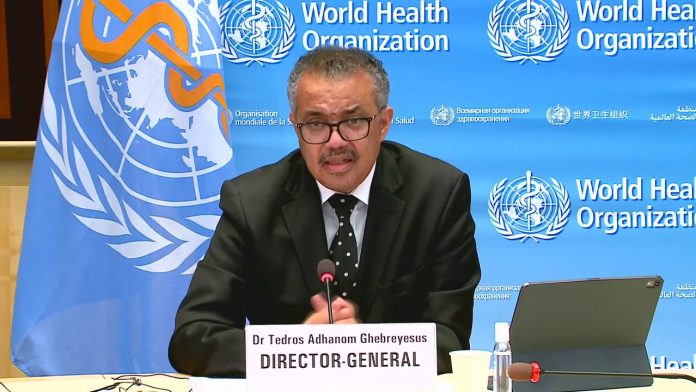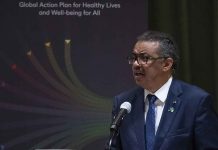“We are experiencing a worsening public health emergency that further threatens lives, livelihoods and a sound global economic recovery. It is definitely worse in places that have very few vaccines, but the pandemic is not over anywhere”, said WHO Director-General Tedros Adhanom Ghebreyesus at a WHO media briefing this week.
Despite these increasing challenges, WHO continues its COVID-19 response in countries around the world with support from partners and donors.
Zambia: WHO donates supplies to strengthen COVID-19 response to the pandemic supported by African Development Bank

Supply delivery in Zambia. Published by WHO/AFRO in July 2021.
WHO and the African Development Bank recently delivered a donation of COVID-19 supplies to Zambia worth one approximately US$1 million to support the country’s pandemic response. The donation included personal protective equipment, ventilators, laboratory reagents and test kits. It was made possible through support provided to the WHO Country Office by the African Development Bank working in collaboration with the Southern African Development Community (SADC). Zambia is among the African countries reporting an increase in new cases and deaths.
Ghana: World Bank support strengthens COVID-19 clinical management

A lab technician in Ghana. Published by WHO/AFRO in July 2021. ©WHO / Blink Media/Nana Kofi Acquah.
The World Bank, through the Pandemic Emergency Financing Facility (PEF), recently provided funds to WHO to enhance the capacity of Ghana’s health system to respond to COVID-19. As a result, treatment facilities in all 16 regions of Ghana have received critical medical supplies such as oxygen concentrators, patient monitors, arterial blood gas analyzers and more. Some 360 multidisciplinary health staff were also trained to effectively manage COVID-19 patients in isolation, treatment facilities and at home. Thanks to the World Bank funding, a greater proportion of patients infected with COVID-19 who require intensive care and ventilator support have higher chances of survival.
Africa: Learning from COVID-19 vaccine rollout

Vaccination campaign in Rwanda. Published by WHO/AFRO in July 2021. ©WHO/Andre Rugema.
From exemplary mass-vaccination stations in Angola, to complex cold-chain logistics in Rwanda and model communications to boost trust in vaccines in Ghana, WHO is documenting key lessons emerging from Africa’s rollout of COVID-19 vaccines.
The Vaccines Learning Agenda team are building a dynamic database of valuable information for African countries. The team creating case studies on a range positive vaccine experiences and overcoming risks and challenges. So far, eight African countries have shared knowledge and best-practices through regional.
Beneficial lessons so far have covered early planning, delivery, digital platforms and risk communications strategies.
Nigeria: Vaccinating refugees and leaving no one behind

A nurse prepares COVID-19 vaccine. Published by WHO/AFRO in July 2021. ©WHO / Blink Media/Nana Kofi Acquah.
Internally displaced persons in the Adagom refugee community in Cross River State recently received their first dose of COVID-19 vaccine as part Nigeria’s drive to leave no one behind including vulnerable populations. The doses were distributed through Nigeria’s allocation from COVAX.
Afghanistan: Enhancing COVID-19 testing with EU support – an investment in health

Herat Regional Reference Laboratory. Published by WHO/EMRO in July 2021.
Afghanistan is currently grappling with a substantial surge in COVID-19 cases across the country. In response to mounting needs, the European Union (EU) Delegation in Kabul donated €15 million to support WHO’s efforts to tackle and mitigate the health and socioeconomic impacts of the pandemic.
While the ongoing vaccination programme has brought new hope, testing remains a key tool to detect and contain cases, especially with the emergence of new variants. Through EU funding, WHO has supported the Ministry of Public Health to establish 12 new COVID-19 testing laboratories and train 68 laboratory technicians, among other response activities.
EU funding is also supporting WHO’s efforts in scaling up Afghanistan’s epidemiological surveillance and capacity to quickly detect and mitigate impacts of COVID-19 and other future health emergencies.
The investment in laboratories will have long-term benefits beyond COVID-19 as they will contribute to improving access to health care at the provincial level.
Lebanon: WHO supports Lebanon in rebuilding blast-destroyed stocking facility with support of Japan and Kuwait.

As the lead international agency supporting the health system in Lebanon, WHO, along with partners, is overseeing the complete reconstruction of the Ministry of Public Health’s Central Drugs Warehouse, which was destroyed in the 4 August port blast. The project is being funded by WHO, Japan and Kuwait.
The plan entails the complete reconstruction of two warehouses, more than doubling previous storage capacity. Over US$ 2 million was provided to complete the project.
Belize: WHO and Canada donate oxygen equipment

Reception of the shipment. Published by WHO/PAHO in July 2021.
The WHO Regional Office for the Americas and the Government of Canada recently donated 25 portable hand-held pulse oximeters to the Karl Heusner Memorial Hospital’s COVID-19 Unit in Belize. The unit is the only public facility in the country providing critical care services for COVID-19 patients.
The donation is part of PAHO’s ongoing technical support to facilitate the monitoring of oxygen saturation among patients admitted to the COVID-19-focused unit.
Also in the Americas, Bolivia and Honduras received new shipments of doses of COVID-19 vaccines delivered by COVAX.
Viet Nam: 2 million doses of COVID-19 vaccines donated by USA through the COVAX Facility

Published by the WHO Viet Nam office in July 2021. ©WHO Viet Nam/Loan Tran
Viet Nam recently received over 2 million COVID-19 vaccine doses donated to the COVAX Facility by the United States Government. The recent shipment is part of the 80 million doses of vaccine that the President of the United States committed in May from the country’s vaccine supply, of which approximately 41 million doses are shared through COVAX to support global needs. The COVAX Facility is co-led by WHO, the Coalition for Epidemic Preparedness and Innovations (CEPI), GAVI – the Vaccine Alliance, and UNICEF as a key delivery partner.







